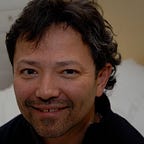Connection 10
Buddhist Philosophy: Emptiness and Becoming (continued)
The Open Self
Emptiness is liberation. We empty ourselves of transcendence and encounter the pure, direct, unmediated experience of reality, the forces of pure change.
In doing so, we cast off ignorance and illusion. We open up to the blue sky of freedom.
We experience the radical freedom of desire overflowing within but no longer grasping or attaching to permanence. We empty ourselves of the transcendent self and step into the flux to experience the wonder of life; we step into nirvana.
Through emptiness we experience the non-self. We experience the self without an essence. We experience the non-existence of the self and existence of the non-self.
We experience the dissolution of transcendent subjectivity and the opening of the contingent self; a multiplicity rising and falling.
We release the closed self, unified and governed by reason, and step into creativity and experimentation.
The Subtle Nature of Life
We experience the subtle existence of all of reality, the rhythm of nature as it spontaneously creates the remarkable. We experience once again what it is like to become with nature.
We come into contact with our Buddha nature, the virtual force within, that evolves in an immanent, luminous reality, within and without. We experience the such-ness of nature and our place in it, the radiance that surpasses thought.
And we experience the natural ease in which compassion arises for all of reality.
We realize that suffering has its genesis in the negation of life; the grasping and clinging to static appearances; the ignorance and illusion of transcendence. Instead we affirm life as it rises within and without us as desire overflowing.
Compassion for all of reality is the affirmation of life. It is the affirmation of the active force of life to create and return difference eternally. Rebirth transforms into the return of pure difference as we are released from the suffering of negating impermanence.
Compassion in This World
Compassion results from the exercise of the will to power; the will that overcomes moral transcendence, and overcomes the suffering caused by a desire as lack that invests itself in essentialism.
As we empty the mind of transcendence we rediscover direct experience; we come back to our natural selves via the lucidity of change, and we are empowered to participate and create. In a virtuous circle, compassion for all of reality propels our creativity, and productivity, forward.
The Engaged Buddhism of Thich Nhất Hanh broadens this idea to incorporate an engaged compassion for all life, all modes of existence, organic and inorganic.
Engaged Buddhism seeks ways to apply compassion for all of life to situations of social, political, environmental and economic suffering and injustice. It seeks to relieve suffering in all its forms.
And a compassion for all of interdependent reality points to a compassion for the environment, the planet we call home. It suggests an ethic of the affirmation of life, broadly understood.
Unmediated Experience
Buddhists mobilize the term “emptiness” as a means of rejecting transcendence: the idea that we can place ourselves outside of our own existence, the immanent plane on which we are constituted and perceive and intuit life.
Impermanence is the observation of a radical empiricism at work in a field of immanence; the humble approach that refuses to be distanced from the direct, unmediated experience of reality; that rejects the abstractions invented by others that would negate life and create only illusion and ignorance.
At the limit, Zen defies all concept making, considers all doctrine secondary, warns of thought as representation; and is concerned only with pure, direct experience. At the limit, there are no concepts, no articulations; just pure unmediated experience. This is Zen.
The Experience of Mindfulness
We have only reviewed a few concepts of Buddhist philosophy and found remarkable resonances with a philosophy of difference.
Buddhism is also a way of life, a spiritual path, and in some strands, a mysticism. There are many paths in Buddhism, but they all lead to a release into the direct experience of life as process.
Experiencing life as pure process and becoming requires a major shift from conventional thought. To this extent there is value in adopting a spiritual appreciation of the virtuality of life; of the sacred in life. But we cannot obtain this appreciation via transcendent thought. It is experiential, a leap of faith into the flow of life.
An appreciation of pure difference, the simultaneous non-duality and plurality of reality, requires an expanded mind. It requires an enchantment with the world as it is and the sense and intuition of a deeper process at work.
We must open our eyes and die into each moment, la petite mort; discard the self and swim in the pure uncertainty of change.
The exercise of the radical freedom opened up by impermanence requires mind awareness of the plane of immanence on which all creativity arises. One way we can open our minds up to the plane of immanence is via the practice of meditation and mindfulness.
I hope you enjoyed this article. Thanks for reading!
Tomas
Please join my email list here or email me at tomas@tomasbyrne.com.
Excerpt from my forthcoming book, Becoming: A Life of Pure Difference (Gilles Deleuze and the Philosophy of the New) Copyright © 2024 by Tomas Byrne. Learn more here.
